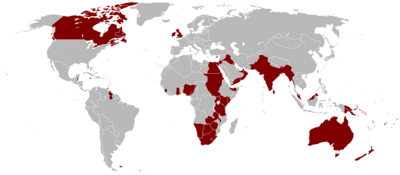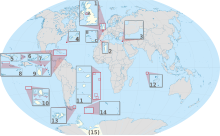The British Empire was, at its peak, the largest empire in history; it controlled just short of a quarter of the world's land area and a quarter of the population. There was a saying that "the sun never sets on the British Empire" because there were colonies all around the world.
It was primarily a maritime empire; from the defeat of the Spanish Armada in 1588 well into the 20th century Britain was by far the world's greatest naval power ("Britannia rules the waves"), and a great trading nation as well.
Understand

| “ | Land of Hope and Glory, Mother of the Free, How shall we extol thee, who are born of thee? Wider still and wider shall thy bounds be set; God, who made thee mighty, make thee mightier yet, God, who made thee mighty, make thee mightier yet. |
” |
—A.C. Benson, set to music by Edward Elgar, 1901 | ||
The British Empire began in 1578 when Queen Elizabeth I started founding colonies in the Caribbean and North America. It expanded in the following centuries involving frequent fighting with European rivals like the Netherlands, France, Portugal and Spain over territory in Asia, Africa and the Americas. The loss of the "thirteen colonies" in North America after the American War of Independence was significant, but the zenith of the empire was only reached much later at the end of the 19th century under Queen Victoria, when the Empire covered nearly one quarter of the land in the world.
During the 20th century, the British Empire was to expand even further following World War I, when Britain was awarded some of the colonial possessions of the defeated Central Powers, reaching its greatest extent in 1921. Eventually, the effects of World War II on the United Kingdom led to a decline of empire, with the independence of most of its colonies in the decades thereafter. After a failed military intervention to hold onto the strategic Suez canal in Egypt in 1956, many regarded Britain to be no longer a global power, though its prestige would be somewhat restored in 1982, when the UK was victorious over Argentina in the Falklands War. The formal handover of its last significant possession, Hong Kong, back to China in 1997 was seen as "the end of the Empire".
Today, the empire is reduced to many small islands and lands as 'British Overseas Territories'. It retains a cultural connection to many of its former colonies through the large Commonwealth of Nations, and some countries such as Australia and Canada keep a constitutional connection by having the British monarch, Queen Elizabeth II, as their head of state. The United Kingdom itself continues to be home to large communities of African, Caribbean, South Asian and Chinese origin as a result of its former colonial empire.
The British empire left a lasting impact on its former possessions, and many British cultural exports continue to be popular in the former colonies. For instance, the game of cricket continues to have a strong following in countries such as India, Pakistan and Australia. Association Football (known as soccer in some places after an Oxfordian term) and Rugby football were also invented in England and saw a global spread in part through the empire, although only in rugby is a preeminence of former parts of the Empire still pronounced. Perhaps the greatest legacy of the British empire that can still be felt today was the spread of the English language around the globe; in modern times English has surpassed other prominent languages such as French and Latin to become by far the world's most widely studied foreign language.
Many former colonies, including Hong Kong, Canada, Australia, New Zealand and even the United States, continue to have a legal system that is heavily influenced by English Common Law. Unlike Roman law (which serves as the inspiration for Civil Law in much of continental Europe), Common Law has a very heavy focus on precedent, so a case from England that was settled centuries past may still influence jurisprudence in - say - Australia today. In addition, common law typically adopts an adverserial system, in which the court serves as an impartial referee between the prosecution and the defence. This stands in contrast to the inquisitorial system adopted by most civil law jurisdictions, in which the court plays an active role in investigating cases.
One of the remarkable things about the empire was the extent to which it was able to recruit former enemies into serving it. Overseas, groups who fought the empire and, after being defeated, provided some of its best regiments included:
- the Gurkhas of Nepal, who even today provide troops to the British, Indian and Bruneian armies. In addition, the Singapore Police Force continues to maintain a Gurkha Contingent as an elite special operations unit.
- the Sikhs whose kingdom of Punjab fell around 1850. Some Sikhs became soldiers while others were recruited into police forces in places like Aden, Singapore, Hong Kong and Shanghai. Today, the Sikh Regiment remains the most decorated regiment in the Indian Army.
- the Pathans of what are now Northwest Pakistan and East Afghanistan. They provided mainly cavalry regiments
Within the British Isles the Scots, Irish and Welsh all resisted English domination at some time, but later helped build the empire. Famous examples included the Welshman Henry Morgan who was the greatest of all privateers and had his base at Port Royal in Jamaica, and the Irishman John Nicholson in India.
Articles about the Empire

There are many articles that cover different aspects of the British Empire:
- United Kingdom — the country that built and ran the empire
- Colonial India and the British Raj — the story of India's time as the largest part of the empire
- Victoria — many places today bear the name of Queen Victoria, who reigned at the peak of the British Empire
- Industrial Britain — the industrial growth of the country during time of empire
- Around the World in Eighty Days - famous story by Jules Verne, detailing a journey through the empire and the rest of the world
- On the trail of Kipling's Kim - an itinerary through the places described in the famous novel set in the British Raj
- Atlantic slave trade - a crime against humanity committed by the British Empire and several other nations
- United States
- Braddock Expedition — A battle between Britain & France before American independence which saw the emergence of many of the future American independence heroes.
- Early United States history — how the United States became a nation and declared independence from the British Empire
- From Plymouth to Hampton Roads is an itinerary of East coast towns that featured in the early British colonies and later in the War of Independence.
British Overseas Territories
Although the term 'British Empire' is rarely used today, some destinations do remain in the form of 'overseas territories'. They are typically self-governing and with the exception of Gibraltar, are not and have never been part of the European Union. The majority are islands. They include:

- Akrotiri and Dhekelia - two military bases on Britain's former colony Cyprus
- Anguilla
- Bermuda
- British Antarctic Territory
- British Indian Ocean Territory
- British Virgin Islands
- Cayman Islands
- Falkland Islands - focal point of the 1982 war against Argentina
- Gibraltar - acquired in the early 18th century and subject to an ongoing dispute with Spain
- Montserrat
- Pitcairn Islands - home to descendants of the Bounty mutiny
- Saint Helena, Ascension and Tristan da Cunha - former exile for Napoleon Bonaparte
- South Georgia and the South Sandwich Islands
- Turks and Caicos Islands
Commonwealth countries
The Commonwealth of Nations is a loose grouping of 53 countries, most of which are former British colonies. All Commonwealth countries are independent, though some of them still share the same monarch as the United Kingdom, with an appointed Governor-General serving as the monarch's representative in each country. The monarch of the United Kingdom retains the position as Head of the Commonwealth, though this position is purely symbolic and does not carry any powers over member countries. The heads of government of the Commonwealth countries meet every two years at the Commonwealth Heads of Government Meeting (CHOGM), which is hosted by different member countries. The British monarch typically also attends or sends a member of the royal family as a representative.
For historical reasons, the diplomatic missions between Commonwealth countries are known as high commissions rather than embassies, and the head of the mission is known as a high commissioner rather than an ambassador. The Queen of the United Kingdom is also Queen of Canada, Australia, Papua New Guinea, New Zealand, Jamaica, Antigua and Barbuda, the Bahamas, Barbados, Belize, Grenada, Saint Kitts and Nevis, Saint Lucia, Saint Vincent and the Grenadines, Solomon Islands and Tuvalu. If an ambassador nominally represents the head of state, a hypothetical New Zealand ambassador to Australia would be representing Elizabeth II to...herself. Wellington would therefore send a high commissioner representing the head of government (in this case the prime minister) instead of an ambassador representing the head of state.
The following are a list of some of the 53 former colonial countries that choose to be part of the British Commonwealth, with or without the British monarch as the head of state:

- Australia
- New Zealand
- India
- Canada
- Pakistan
- Bangladesh
- Malaysia
- Singapore
- South Africa
- Kenya
- Nigeria
- Sri Lanka
- Jamaica
- Bahamas
- Fiji
Commonwealth Games

The Commonwealth Games are a multi-sport games competed by national teams from countries in the Commonwealth, the UK and British Overseas Territories. The games are similar in format to the Summer Olympics, and are held every four years, two years apart from the Summer Olympics. The first games were held in 1930 as the British Empire Games. Unlike at the Olympics, the home nations of the UK (England, Scotland, Wales and Northern Ireland) send separate teams to the Commonwealth Games, and the Games feature several non-Olympic sports that are popular in the Commonwealth such as squash and lawn bowls.
The last Commonwealth Games were in the Gold Coast in Australia in 2018, and the next Commonwealth Games will be held in Birmingham in England in 2022.
Related subjects
- Cricket - a game played by almost all countries of the Commonwealth
- Rugby football - a sport that originated in England and is today played in many nations of the former British Empire, although other countries (such as Argentina, France, Italy and Japan) have also enthusiastically taken it up as well
- Association football (soccer) was invented in England and was in part spread through merchants, missionaries, teachers and expatriates throughout the entire world.

